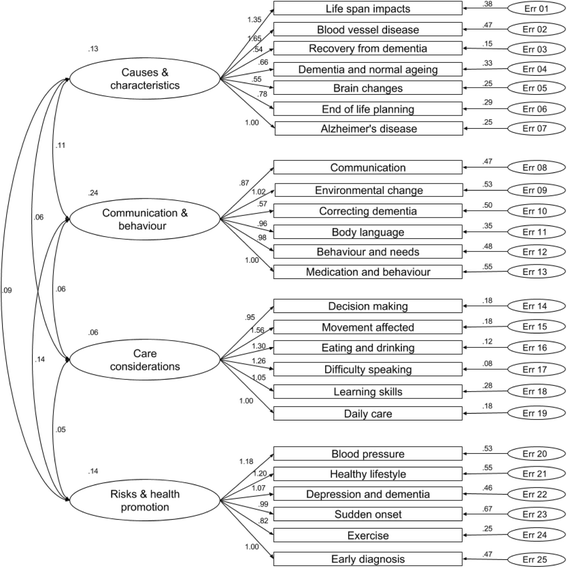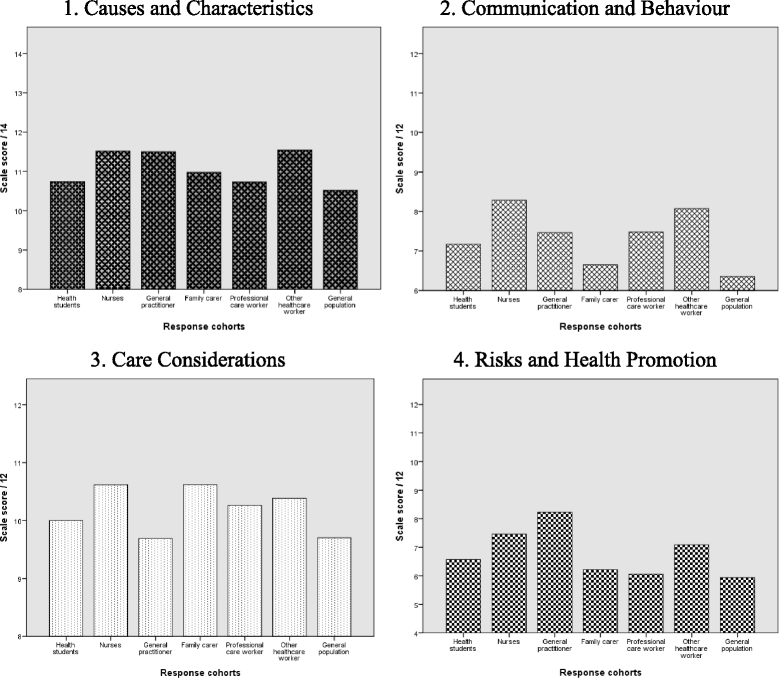Dementia knowledge assessment scale (DKAS): confirmatory factor analysis and comparative subscale scores among an international cohort
- PMID: 28760154
- PMCID: PMC5537989
- DOI: 10.1186/s12877-017-0552-y
Dementia knowledge assessment scale (DKAS): confirmatory factor analysis and comparative subscale scores among an international cohort
Abstract
Background: Dementia is a life-limiting condition that is increasing in global prevalence in line with population ageing. In this context, it is necessary to accurately measure dementia knowledge across a spectrum of health professional and lay populations with the aim of informing targeted educational interventions and improving literacy, care, and support. Building on prior exploratory analysis, which informed the development of the preliminarily valid and reliable version of the Dementia Knowledge Assessment Scale (DKAS), a Confirmatory Factor Analysis (CFA) was performed to affirm construct validity and proposed subscales to further increase the measure's utility for academics and educators.
Methods: A large, de novo sample of 3649 volunteer respondents to a dementia-related online course was recruited to evaluate the performance of the DKAS and its proposed subscales. Respondents represented diverse cohorts, including health professionals, students, and members of the general public. Analyses included CFA (using structural equation modelling), measures of internal consistency (α), and non-parametric tests of subscale correlation (Spearman Correlation) and score differences between cohorts (Kruskal-Wallis one-way analysis of variance).
Results: Findings of the CFA supported a 25-item, four-factor model for the DKAS with two items removed due to poor performance and one item moved between factors. The resultant model exhibited good reliability (α = .85; ω h = .87; overall scale), with acceptable subscale internal consistency (α ≥ .65; subscales). Subscales showed acceptable correlation without any indication of redundancy. Finally, total and DKAS subscale scores showed good discrimination between cohorts of respondents who would be anticipated to hold different levels of knowledge on the basis of education or experience related to dementia.
Conclusion: The DKAS has been confirmed as a reliable and valid measure of dementia knowledge for diverse populations that is capable of elucidating knowledge characteristics across four coherent domains: 1) Causes and Characteristics, 2) Communication and Behaviour, 3) Care Considerations, and 4) Risks and Health Promotion. Importantly, the four confirmed subscales clearly distinguish between groups who might be expected to hold differing levels of knowledge about dementia, allowing for a fine-grained level of detail to be established when evaluating baseline understanding or knowledge change associated with educational intervention.
Keywords: Confirmatory factor analysis; DKAS; Dementia; Knowledge; Scale psychometrics.
Conflict of interest statement
Ethics approval and consent to participate
Ethics approval for the collection of volunteer participants’ dementia knowledge data and demographic information was granted by the University of Tasmania Human Research Ethics Committee for Social Sciences (Ref no. H0013532). Participants were informed that consent for study participation was implied by the submission of a completed online survey consistent with the Australian National Statement on Ethical Conduct in Human Research.
Consent for publication
Not applicable.
Competing interests
The authors declare that they have no competing interests.
Publisher’s Note
Springer Nature remains neutral with regard to jurisdictional claims in published maps and institutional affiliations.
Figures
References
-
- World Health Organization . Neurological disorders: public health challenges. Geneva, Switzerland: World Health Organization; 2006.
-
- Hughes J, Bagley H, Reilly S, Burns A, Challis D. Care staff working with people with dementia: training, knowledge and confidence. Dementia. 2008;7(2):227–238. doi: 10.1177/1471301208091159. - DOI
-
- Robinson A, Eccleston C, Annear M, Elliott K, Andrews S, Stirling C, Donohue C, Banks S, Toye C, McInerney F. Who knows, who cares: nurses, care workers and family members’ knowledge of dementia. J Palliat Care. 2014;30(3):158–165. - PubMed
MeSH terms
LinkOut - more resources
Full Text Sources
Other Literature Sources
Medical



